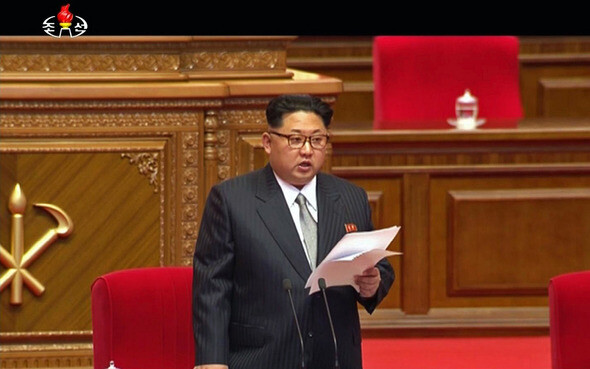hankyoreh
Links to other country sites 다른 나라 사이트 링크
[Editorial] Seoul must respond to North Korea’s calls for dialogue

During his summation report to the 7th Congress of the Korean Workers’ Party (KWP), North Korean leader Kim Jong-un proposed holding military talks between North and South Korean to dispel the risk of a military clash and to relax the heightened tensions. With inter-Korean relations in disarray because of North Korea’s repeated nuclear tests and the South Korean government’s shutdown of the Kaesong Industrial Complex, it is noteworthy that North Korea’s leader has personally come forward to suggest holding talks.
Another noticeable aspect of Kim’s report was his reference to North and South Korea as “partners in unification” and his call for the implementation of the June 15th North-South Joint Declaration and the October 4 Declaration. By emphasizing the significance of these declarations, North Korea could be sending a positive signal about repairing its strained relationship with South Korea.
Considering that North Korea has maintained a barrage of hardline remarks aimed at the South Korean government, the fact that Kim refrained from criticizing South Korea in the report and spoke of dialogue and negotiations in a softer tone could be taken as implying willingness to restore inter-Korean relations.
The South Korean government must not ignore North Korea’s proposal as being merely a “meaningless peace offensive.” While the North can be seen as reaching out to South Korea in order to get relief from the international sanctions resulting from its nuclear tests, this does not change the fact that dialogue is necessary.
In connection with these circumstances, the fact that James Clapper, US Director of National Intelligence, paid a quiet visit to South Korea on May 4, just before the KWP Congress, probably deserves a second look. Clapper reportedly met high-ranking South Korean government officials and asked how many concessions the South Korean government would be willing to make if the US entered peace talks with North Korea. This could also be seen as suggesting the possibility of under-the-table negotiations between the US and North Korea.
Rather than insisting that North Korea must give up its nuclear program before talks can occur, the South Korean government needs to show its willingness to resolve the deadlock in inter-Korean relations. Prolonging the standoff between North and South Korea is not helpful for either side. Given the current suffering of the South Korean business owners and employees affected by the Kaesong shutdown, the sooner a breakthrough is found, the better.
Please direct questions or comments to [english@hani.co.kr]

Editorial・opinion
![[Column] Season 2 of special prosecutor probe may be coming to Korea soon [Column] Season 2 of special prosecutor probe may be coming to Korea soon](https://flexible.img.hani.co.kr/flexible/normal/500/300/imgdb/original/2024/0426/3317141030699447.jpg) [Column] Season 2 of special prosecutor probe may be coming to Korea soon
[Column] Season 2 of special prosecutor probe may be coming to Korea soon![[Column] Park Geun-hye déjà vu in Yoon Suk-yeol [Column] Park Geun-hye déjà vu in Yoon Suk-yeol](https://flexible.img.hani.co.kr/flexible/normal/500/300/imgdb/original/2024/0424/651713945113788.jpg) [Column] Park Geun-hye déjà vu in Yoon Suk-yeol
[Column] Park Geun-hye déjà vu in Yoon Suk-yeol- [Editorial] New weight of N. Korea’s nuclear threats makes dialogue all the more urgent
- [Guest essay] The real reason Korea’s new right wants to dub Rhee a founding father
- [Column] ‘Choson’: Is it time we start referring to N. Korea in its own terms?
- [Editorial] Japan’s rewriting of history with Korea has gone too far
- [Column] The president’s questionable capacity for dialogue
- [Column] Are chaebol firms just pizza pies for families to divvy up as they please?
- [Column] Has Korea, too, crossed the Rubicon on China?
- [Correspondent’s column] In Japan’s alliance with US, echoes of its past alliances with UK
Most viewed articles
- 1[Column] Season 2 of special prosecutor probe may be coming to Korea soon
- 2‘We must say no’: Seoul defense chief on Korean, USFK involvement in hypothetical Taiwan crisis
- 3Is N. Korea threatening to test nukes in response to possible new US-led sanctions body?
- 4Division commander ordered troops to enter raging flood waters before Marine died, survivor says
- 5Amnesty notes ‘erosion’ of freedom of expression in Korea in annual human rights report
- 6Is Japan about to snatch control of Line messenger from Korea’s Naver?
- 7No good, very bad game for Korea puts it out of Olympics for first time since 1988
- 8[Editorial] Korea’s surprise Q1 growth requires objective assessment, not blind fanfare
- 9N. Korean delegation’s trip to Iran shows how Pyongyang is leveraging ties with Moscow
- 10Korea’s 1.3% growth in Q1 signals ‘textbook’ return to growth, says government